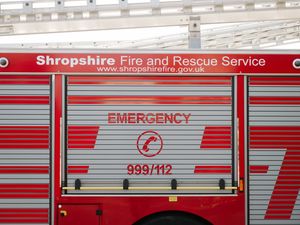Army reserves: Call of duty just got tougher
The four silhouetted figures are just about visible in the early morning gloom as they slowly make their way down the foot of the hillside.
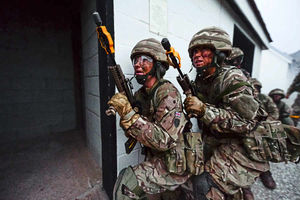
Walking silently in single file with machine guns pointing out in front of them, the group make their way to a rocky area that offers cover on the edge of the small village.
They are the first wave of an incursion team; dispatched to clear an area that military intelligence suggests is occupied by an unspecified number of enemy forces.
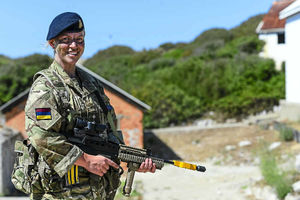
She is a junior doctor who will normally be found on the wards of Shropshire's Royal Shrewsbury or Princess Royal hospitals.
But Stacey Cromey-Hawke is just as comfortable with a machine gun in her hand.
The doctor is also an Army captain, part of a new British Army in which reservists are vital to Britain's security both at home and abroad. Today the Shropshire Star has the first of three exclusive reports following TA soldiers on exercise in Gibraltar.
Captain Stacey Cromey-Hawke, 25, from Shrewsbury, is hoping to specialise in trauma surgery. She said: "I see my future as having two careers.
Crouched in silence, the quartet, who are dressed in desert combat uniforms and have their faces daubed in war paint, hold their positions for around 15 minutes while reinforcements begin to descend the hill.
Then all hell breaks loose.
The repetitive crack of machine gun fire fills the air, as two members of the group surge through the door of a white single floor house.
Within seconds one of them shouts: "Room one clear!" while two comrades move past them through the tight corridor into a second room.
There's a loud explosion as a grenade is hurled into the room, killing one of the enemy and sending smoke billowing into the sky.
"One enemy down!" is the cry, as more troops move past and clear the building's final room.
They stoop low behind an open window and return fire on a three-man enemy squadron that is shooting at them from across the village.
With lightning speed the unit's section commander skirts back past the house and orders troops stationed on the hill to move down into the village.
Over the course of almost an hour they systematically move through six houses spread across the village, securing each one as they pass through and taking out six of the enemy, blasting their way through 8,500 rounds of ammunition in the process.
From my vantage point high on the roof of a two-storey building around 100 metres away the operation looks calculated and methodical.
It is the type of mission that combat soldiers have undertaken on numerous occasions in recent years in Afghanistan and Iraq.
But today's location is a specially adapted British Army base in Gibraltar, and none of those taking part in the 'mission' are full-time serving soldiers.
I had just witnessed a training exercise featuring a 20-strong team of British Army Reserves from 202 Field Hospital, many of whom work as doctors, nurses and support staff in hospitals and medical centres in and around Shropshire, Staffordshire and the Black Country.
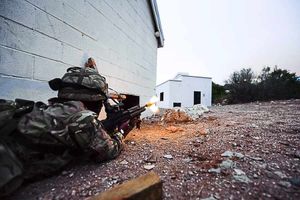
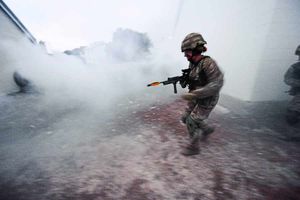
They're medical professionals that are being trained to kill.
The exercise is run by Captain Gary Cole, a former regular of 24 years who joined 202 Field Hospital nine months ago and is based at the unit's headquarters in King's Heath, Birmingham.
"To put it bluntly, for these people this is a move from saving lives to taking lives," the 42-year-old explained. "For most of the reserves this is completely new.
"The changing face of modern warfare means we don't fight in open fields anymore. And with the changes taking place within the military it is possible that reserves could be called into this type of situation while on deployment.
"Our job is to make sure everyone is prepared and has had some form of experience."
The changes Cpt Cole is referring to form part of the Ministry of Defence's Army 2020 vision, a move which has already seen major units cut, while the number of reserves is set to double.
The future army will fully integrate regulars and reserves within a whole force, so that in five years time the Army will consist of 82,000 regular personnel and 32,000 reserves – with the latter group used routinely rather than being called up in extreme circumstances.
To that end reserves are now given the highest level of training in the force's 107-year history, with medical staff trained to prepare for combat situations for the first time.
Cpt Cole is ideally placed to show the reserves the ropes, having been involved in similar situations in real life during four operational tours of Afghanistan.
"This type of training is part of a military skills package that prepares reserves for real life scenarios," said Cpt Cole, who has also served in Northern Ireland, Bosnia and Kosovo.
"In conflict the main task of these guys would be to provide medical care, but there is a greater emphasis on the role of reserves in the modern army.
"They could also need to perform care while under fire, so it is vital for them to know how to react when a situation turns nasty.
"We're taking them out of their comfort zones and challenging them to think in new ways under high pressure circumstances."
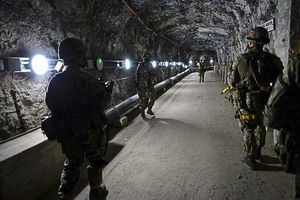
At the end of the exercise – dubbed Fighting In Built Up Areas (FIBUA) – Cpt Cole gathers the reserves around for a rundown of the strengths and weaknesses of the mission.
Section commander Andrea Wolfe – a reserve of four and a half years who played a leading role in orchestrating the operation – is also called forward to give her views.
The 25-year-old foundation year doctor from Leamington Spa has ambitions to progress through the ranks of the reserves. She said she relishes the challenge of leading the unit into battle. "For all of us this is great field experience," she said.
"My role involves commanding three sections, telling them where I want them to be and when the right time is for the next section to move in.
"It involves a lot of moving back and forth on my part because I have to get an accurate picture of what's going on. It's a big challenge, because one mistake and we could miss something, which in a real life situation could have disastrous consequences.
"Fortunately everything went well today, mainly thanks to the drive and enthusiasm of the team."
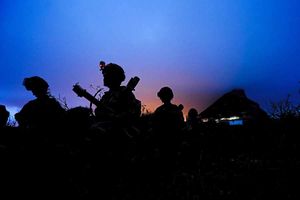
The exercise is supplemented with tunnel warfare training, with Gibraltar serving as the ideal location thanks to the presence of a vast network of tunnels dug into the rock over a period spanning more than 250 years. The reserves enter via the Great North Road, a 60ft (18m) wide tunnel created by the Royal Engineers in 1940. Once inside conditions vary from searing heat to damp and cold, with ambient light replaced by complete darkness in a matter of footsteps.
For the unit, the task is to clear a 200m section of the caverns, engaging with any 'enemy' along the way while keeping an eye out for hidden explosive devices.
This includes a 'rolling drill', where enemy soldiers, lying face down on the ground are checked to ensure they are dead and are not concealing booby traps.
Cpt Cole said: "It's something that you'll see in warfare, where an enemy soldier will appear to be dead, but when you flip them over they're holding on to a grenade.
"If you're not prepared the result can be fatal. It's about having total awareness of the situation so you and those around you can react in the right way." He added: "The tunnels are an extremely challenging environment. Conditions are pretty awful. The exercise is designed to be a real test for the platoon.
"They have to be thinking all the time. For example, use too much firepower down here and there's a serious danger of blowing up the tunnel. We know we're asking a lot of reserves by putting them through this, but that's deliberate.
"The sense of achievement they get from clearing the tunnels – even in a training exercise – is massive. There's a feeling of 'if I can do this, I can do anything'."
To add to the realism of the training the troops sleep out in the field the night before the exercise before rising at 4am to prepare their kit. They then have the chance to take part in a long-standing military tradition that has been embraced by 202 Field Hospital.
In the moments before going into battle soldiers are encouraged to spend a period of quiet reflection with the unit's priest, Padre Colin Butler.
The troops sit down in a large semi-circle and listen to a passage from the Gospel of St Mark before prayers. There's even a hymn, with a rousing chorus of Bread of Heaven.
An army chaplain for 16 years, Padre Butler, from Birmingham, wanted to continue providing spiritual guidance to troops and joined 202 Field Hospital at the start of this year.
"It's an opportunity for them to think about the people they love and reflect on the situation facing them," he said. "We ask them to gather together, as is customary out in the battlefield. There's a moral reason behind doing this. Soldiering is an honourable profession, but there are times in battle when mistakes are made."
202's commanding officer, Colonel Glynn Evans said: "At times it's hard for soldiers, or anyone for that matter, to get their heads around war, particularly when you are out on deployment. Everything is different. Friends and family are left behind and it can be a lonely old place. Knowing that there is some comfort available can be a real blessing for some troops."



